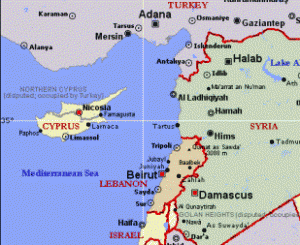 Lebanon may auction rights within the next 12 months for undersea oil and natural-gas exploration, spurred by energy projects in the waters off neighboring Israel, an adviser to the country’s parliament speaker said.
Lebanon may auction rights within the next 12 months for undersea oil and natural-gas exploration, spurred by energy projects in the waters off neighboring Israel, an adviser to the country’s parliament speaker said.
Lebanon’s parliament is likely to approve a law on offshore exploration as early as tomorrow, Ali Hamdan said in a telephone interview from Beirut. “There is a big chance for the law to be voted tomorrow, and it will be an important step to start the process of organizing tenders for interested companies within a year,” he said.
Once the law is ratified, Lebanon will define its maritime border and send the relevant documents to the United Nations Security Council, Hamdan said. Parliament Speaker Nabih Berri and his allies in the Hezbollah militant organization, which fought a war with Israel in 2006, have urged the energy law’s prompt adoption.
“We are in a hurry because Israel is in a hurry and is exploring near our border, and we are afraid that it will steal our wealth,” Hamdan said.
Large discoveries of gas off Israel’s Mediterranean coast have sparked a debate between the neighbors over their respective rights to energy resources in the area. While Lebanon has not officially accused Israel of exploring for gas outside its territorial waters, the issue has inflamed tensions because the two states are technically at war.
Israel Warns
Israel’s Minister of National Infrastructures Uzi Landau said on June 23 that his government was willing to use force to protect its undersea gas finds.
To help speed up passage of the law on undersea exploration, Lebanon’s political parties agreed to consider separately the establishment of both a committee to oversee offshore exploration and production and a fund for the government’s share of any potential revenue, Hamdan said.
The sea off Lebanon and the nearby island of Cyprus may prove to be “an exciting new province for oil and gas,” Norway-based Petroleum Geo-Services, the world’s third-biggest surveyor of oil and gas fields, said in October in a statement on its website.
U.S.-based Noble Energy Inc. and Israeli companies have announced two offshore gas discoveries in the past 18 months. Noble has said these deposits may hold 24 trillion cubic feet of gas, or twice the size of Britain’s proved gas reserves in 2009, according the CIA’s World Factbook.
Lebanon Responds
Lebanese Energy Minister Gebran Bassil said on June 17 that his government had warned Noble not to work near Lebanon’s maritime economic zone. He said his country would not allow Israel or a company working on its behalf “to take any amount of our gas that is falling in our zone.”
Israel’s exploration for gas has aggravated divisions within Lebanon, with the Hezbollah-led opposition accusing the government of pro-Western Prime Minister Saad Hariri of neglecting the country’s offshore energy potential. Meetings of parliamentary committees over the last few months have failed to to make progress toward ratification of the law because of disputes between the two sides.
“We don’t want issues related to the overseeing committee or the fund to stall the exploration process,” Hamdan said. “These anyway take time and can be voted later on.”
Hamdan said revenue from any offshore gas finds could help finance development projects and repay Lebanon’s public debt, which totaled $52 billion at the end of February, or about 147 percent of the country’s gross domestic product.

Leave a Reply
You must be logged in to post a comment.